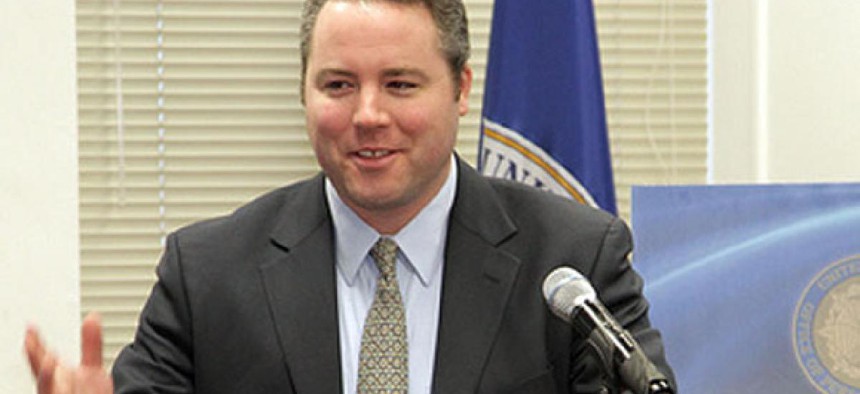
“Buying smarter means buying less, but doing it in a more thoughtful and focused way,” said Joe Jordan, administrator of the White House Office of Federal Procurement Policy. OPM file photo
Are We Headed for an Acquisition Brain Drain?
Procurement chief warns of an exodus, tells vendors he’d ‘widen the aperture’ to recruit contracting officers.
The top federal procurement officer on Thursday called for “not a tweak but a full rethink” of the government’s planning for its acquisition workforce, warning that as many as 40 percent of the 36,000 federal contracting officers could retire in the next five years.
Joe Jordan, administrator of the White House Office of Federal Procurement Policy, compared the coming brain drain to water flowing out of a “giant bathtub,” saying he plans to push agencies to “widen the aperture of who they recruit.”
Hiring managers should sell their agencies “as a good place to work for anyone who is smart and wants to serve” and then train them at facilities such as the Federal Acquisition Institute, Jordan told an audience of vendors and agency staff at the “Acquisition Excellence” conference hosted jointly by the American Council for Technology-Industry Advisory Council and the General Services Administration. “Retaining these people in an era of continuing resolutions and pay freezes is a real challenge.”
Joining with acting GSA Administrator Dan Tangherlini, Jordan stressed the value of dialog with industry on ways to improve the acquisition process while highlighting the Obama administration’s efforts to encourage efficiency, buy smarter, build agency relationships with government suppliers and develop a savvier acquisition workforce.
“Buying smarter means buying less, but doing it in a more thoughtful and focused way,” said Jordan. He noted the administration was successful at reducing contracts by $20 billion in fiscal 2012 and moving interagency contracting off the Government Accountability Office’s list of high-risk programs.
Agencies should shift the conversation about economical purchasing from a culture of “I think, I feel” to a culture of “data-driven analytics,” Jordan said, calling for incentives for contracting officers to take managed risks. Though the Federal Acquisition Regulation states that actions not expressly prohibited can be pursued, he said, too many contracting officers work with an overly cautious mind-set for fear of congressional criticism. The administration “is standing up and saying, ‘Look we’re giving you air cover, so if you’ve done solid analytics and it didn’t work out, that’s okay. You made the right call, now what can we learn.’ ”
Jordan stressed his office’s governmentwide push for greater use of strategic sourcing, and said he would like to move beyond the “boutique cuts” in contracts for office supplies and printing to more “transformational” approaches that “leverage the buying power of biggest purchaser in the world.” He said agencies have far too little information on prices other agencies paid for tables and chairs and pens and pencils. The Procurement Office is partnering with GSA and the Defense Department on new software to “bootstrap an initial solution,” he said.
As a symbol of his office’s new push for dialog with industry and among agencies, Jordan touted his new Twitter account.
Tangherlini underlined the importance of streamlining the acquisition process for all agencies in the context of doing more with less in a period of “unprecedented budget cuts, which the sequester intensified, and which will be the environment for the foreseeable future.”
GSA’s schedules and its other shared services offerings enjoy only a 10 percent share of the federal acquisition market,” he said. He wants to increase that share by partnering with agencies to “aggregate our purchasing power and reduce costs to the government.” Purchasing officers who go out on “the open market incur their own costs in unnecessary and wasteful duplication,” Tangherlini said. “The government has 4,000 wireless plans at different prices. The average family does a far better job of cellphone pricing.”
Describing GSA’s restructuring to consolidate functions such as information technology, human resources and financial services, the acting GSA head praised his newly assembled management team that includes Michael Casella as chief financial officer, Thomas Sharpe as commissioner for the Federal Acquisition Service (who spoke at the same conference) and Dorothy Robyn as commissioner for the Public Buildings Service.
“We want you to work with us and challenge us to make our offerings better,” Tangherlini told the vendors and employees of other agencies. “If GSA doesn’t meet the acquisition needs, tell us why so we can meet them.”
Lesley Field, the deputy administrator for federal procurement policy, told a subsequent panel discussion that free dialog with industry “is one way to leapfrog toward innovation,” adding that her office’s quarterly front-line forum meetings with contractors has provided “great ideas for innovation and feedback” on OFPP memos. She encouraged all agencies to take advantage of such dialog.







